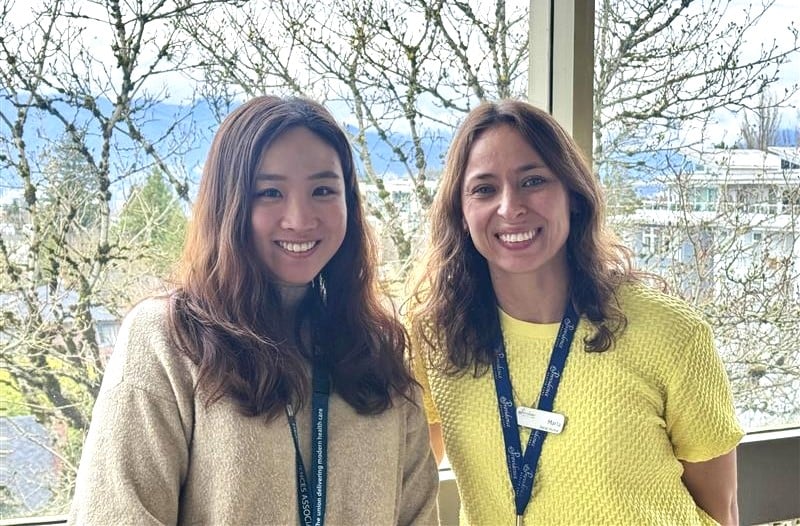When Occupational Therapist, Kelly Yeung, and Social Worker, Marla McCormack, walk through the doors of Parkview Tertiary Mental Health Unit each morning, they know one thing for certain: no two days will ever look the same. And for both of them, that unpredictability is part of what makes their work so meaningful.
“Ever-changing,” says Kelly.
“Enlightening,” adds Marla.
Together, they’re part of a deeply collaborative team caring for older adults living with complex mental health needs, often tied to dementia and neurocognitive disorders. At Parkview, patients are admitted to an acute unit for stabilization and specialized support – often during a vulnerable, and sometimes final, chapter of life.
“Sometimes, the Parkview journey is the last chapter,” Kelly reflects. “I still remember hugging the family of a patient who had passed, and they said, ‘We’re thankful to have you in the last chapter of my mum’s life.’ That moment will stay with me forever.”
Different paths, shared purpose
Originally from Hong Kong, Kelly started her OT career in 2016 and spent six years working in a neurology unit before moving to Vancouver in 2022. For Marla, a move from Winnipeg to the West Coast in 2010 marked the beginning of her journey into social work. Her practicum placement with PHC during her Master of Social Work studies opened the door to a long-term career in geriatric mental health.
“I’ve always had an interest in dementia and caregiver support, so naturally I was led to this field,” says Marla. “Parkview really is a hidden gem.”
Both Kelly and Marla emphasize the importance of supporting caregivers as part of the healing process.
“It’s not just about the patient,” says Kelly. “Caregivers’ mental health matters so much.”
Marla agrees. “I enjoy connecting with caregivers and hearing about the lives of our patients before their dementia progression. Those stories are so important.”
The small moments that matter most
At Parkview, days are filled with a wide range of tasks: Kelly might be facilitating therapeutic activities with rehab assistants, while Marla could be helping a family access financial support, engaging in end-of-life conversations, or advocating for caregiver resources. Both say it’s the unexpected moments of human connection that make the biggest impact.
“It always makes me smile when I witness loving, tender moments between our patients with dementia and their loved ones,” says Marla. “Those are the things that stay with you.”
Navigating challenges, together
Working in an acute mental health unit brings its share of challenges – from shifting patient needs to the emotional intensity of supporting families in crisis. For Marla, the hardest part is often prioritizing support when everything feels urgent. “You can’t put a timeline on supporting people,” she says. “It’s woven throughout my day.”
But both Kelly and Marla agree that their team keeps them grounded.
“We’re truly a team,” says Marla. “We’re constantly collaborating – and we use humour to get through hard situations. We try to make each other smile as we navigate challenges.”
“At the end of the day, I love gathering in the rehab office and sharing about our work,” Kelly adds. “It’s such a supportive team.”
Keeping balance, and lifting the stigma
Outside of work, Kelly finds calm in hiking, music, and spending time with her two cats. Marla stays grounded through regular exercise and a clear boundary between work and home life. “When I walk through my doors at home, I try to leave the day behind and focus on my family,” she says.
Both women see Mental Health Week as a valuable reminder of the importance of awareness and self-care – not just for patients, but for providers too.
“This week helps lift the stigma attached to those dealing with mental health challenges,” says Marla. “It’s also a chance to share what we do in geriatric psychiatry – and how important this work is.”
Words of advice for future mental health professionals?
“Just give it a shot,” says Kelly. “You never know what you’ll like until you try.”
“A career in mental health is exceptionally rewarding, but it’s important to be self-aware,” adds Marla. “Make time for reflection, build your coping skills – and if you ever need help navigating the system, find a social worker!”
Join us in supporting mental health – because people need people
Whether you’re thinking about a career in mental health or looking for a way to make a difference, there’s a place for you at Providence Health Care. Learn more about our open roles and discover how you can help change lives from the inside out.
Want to support the Parkview team and the impactful work they do every day? Your donation helps ensure patients receive compassionate, comprehensive care when they need it most.
Donate to Mental Health Services at Providence
Together, we can break the stigma, build connections, and show that mental health matters – today and every day.
Read more stories like this:
- MENTAL HEALTH WEEK: HELPING YOUNG PEOPLE THRIVE THROUGH CONNECTION AND CREATIVITY
- MENTAL HEALTH WEEK: SUPPORTING NEW PARENTS THROUGH COMPASSION AND EDUCATION
- MENTAL HEALTH WEEK: FOOD, FREEDOM, AND HEALING IN EATING DISORDER RECOVERY
- MENTAL HEALTH WEEK: SUPPORTING THE WHOLE PATIENT WITH CIRT





